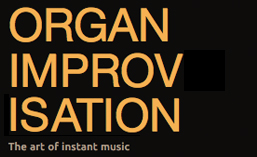Last week I introduced the qualities I call the Four C’s of Improvisation: a successful improvisation is competent, convincing, coherent and colorful. Last week I explored the area of competency, discussing knowledge of the organ, technical skills and musical formation. This week, we’ll look at how we can be convincing while living in the moment and being open to a future that of unknown possibilities.
Rhythm
Good public speaking requires fluidity. Words just roll off the tongue of good speakers. No hesitations. No ums or uhs. Even in conversation, unless we get interrupted, our thoughts generally flow from start to finish if we know what we intend to say. To be convincing, I believe improvisers must maintain the same rhythmic flow as good speakers. Any hesitancy makes our statement weaker. What’s the surest way to know a performer has made a mistake while playing a piece of repertoire? A disruption in the rhythm! (And no, rests are not necessarily a disruption in the rhythm. Plenty of good pieces make ample use of them.)
Thinking
When learning a written composition, we usually practice slowly, especially the difficult passages. This enables us to take the necessary time to read the music and find the notes without disrupting the flow. We need to do the same when improvising. One of the lessons I learned from Naji Hakim was “Never improvise faster than you can think.” If our rhythm hesitates, perhaps we are playing too quickly and need to slow our hands and feet down so that our brain can catch up. One of the surest ways to run into problems is to let our hands and feet wander aimlessly over the keyboard. While we might manage to be rhythmic, chances are our coherence may go out the window.
Conviction
There is no better way to be convincing than to play what we play with conviction. One of my favorite British entertainers is Derren Brown. On one of his TV series, he went to the track and through primarily a strong sense of conviction was able to collect winnings from losing bets. He even teaches someone else to do the same thing. (Watch the clip here.) On a visit to New York, he pays for food and jewelry with paper! While he employs a few other tricks, if he had any doubts or hesitation about what he was doing, his chance of success would drop precipitously. If we can make musical statements with as much conviction as Derren Brown uses words, lots of other details can be ignored while still providing an enjoyable experience to the listener.
To be convincing, we must improvise rhythmically, no faster than we can think and with conviction. The first two of these also help in being coherent, our topic for next week.
For this week, may all your improvs be convincing!
Glenn Osborne
Recent additions to organimprovisation.com:
Artists:
Themes:
Newsletter Issue 3 – 2014 05 12
See the complete list of past newsletter issues here.
Sign up to receive future issues using the box to the right on this page.
